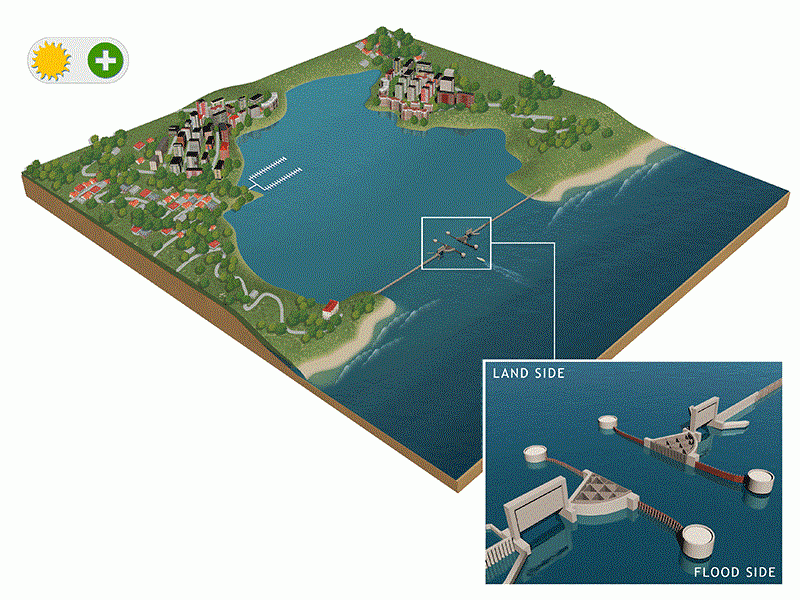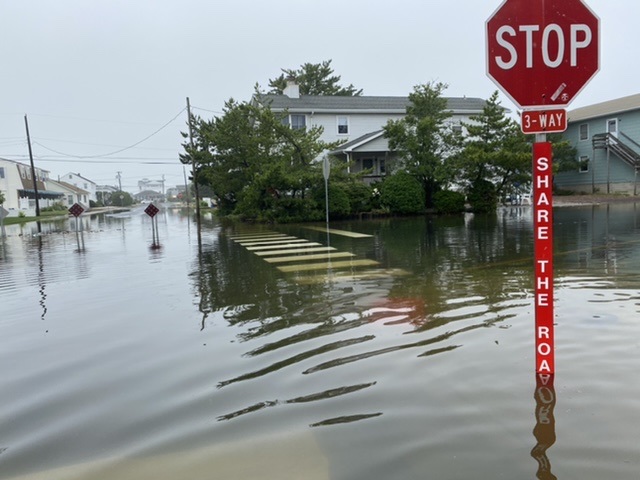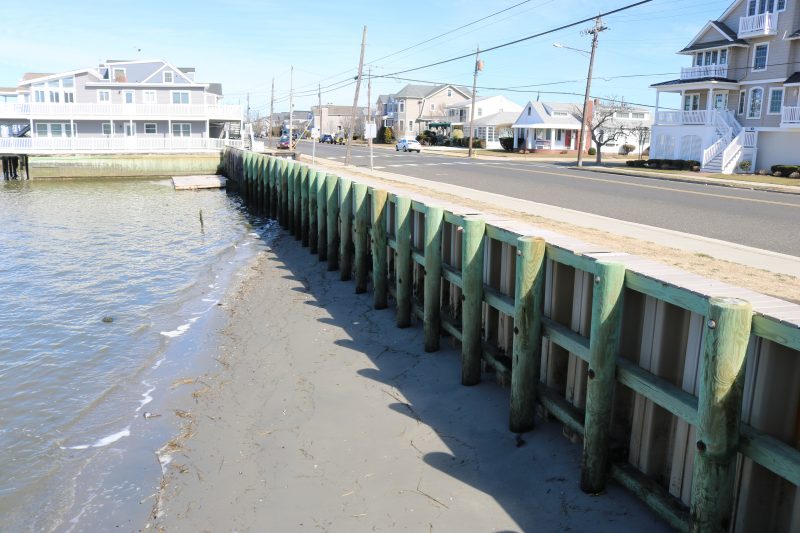A rendering depicts what a storm surge barrier in the inlet would look like. (Courtesy of U.S. Army Corps of Engineers)
 By DONALD WITTKOWSKI
Federal officials want to build a massive storm surge barrier across the Great Egg Harbor Inlet between Ocean City and Longport as part of $16 billion in proposed projects to protect the Jersey Shore from flooding along the back bays.
Nearly 5,000 feet long and 19 feet high, the barrier would consist of swing gates that would be closed during major storms to prevent floodwaters from threatening Ocean City, Longport and other communities near the inlet that connects the bay with the ocean.
The U.S. Army Corps of Engineers, a federal agency that oversees shore-protection projects, is proposing to build storm surge barriers across the Great Egg Harbor Inlet, the Manasquan Inlet and the Barnegat Inlet along the New Jersey coast.
At an online public hearing Tuesday, representatives of the Army Corps and the New Jersey Department of Environmental Protection outlined a series of proposed projects designed to reduce floodwaters along the back bays.
The projects are contained in a newly released report by the Army Corps – called the New Jersey Back Bays Coastal Storm Risk Management Study – that considers a total of $16 billion in projects to protect a large swath of Atlantic, Cape May, Burlington, Ocean and Monmouth counties.
“Things are dire, and things could become worse with sea level rise and increased frequency and severity of storms,” said Jay Smith, the project manager for the Army Corps.
Officials emphasized that the draft study is only a preliminary plan that still must go through several phases of review and approval before it becomes final in April 2023. Moreover, the proposed projects would need to be funded by Congress before they could be built.
“This is years away,” Steve Allen, an Army Corps official, said of the prospect of actually constructing the projects.
Tentatively, the plan is to begin construction in 2030 and continue building the projects through 2080. Although the flood-control projects would cost about $16 billion, the Army Corps estimates that they would reduce storm damage by $40 billion over the same 50-year period.
“We’re proposing some rather novel things along the coast, particularly the storm surge barriers,” Allen said.
By DONALD WITTKOWSKI
Federal officials want to build a massive storm surge barrier across the Great Egg Harbor Inlet between Ocean City and Longport as part of $16 billion in proposed projects to protect the Jersey Shore from flooding along the back bays.
Nearly 5,000 feet long and 19 feet high, the barrier would consist of swing gates that would be closed during major storms to prevent floodwaters from threatening Ocean City, Longport and other communities near the inlet that connects the bay with the ocean.
The U.S. Army Corps of Engineers, a federal agency that oversees shore-protection projects, is proposing to build storm surge barriers across the Great Egg Harbor Inlet, the Manasquan Inlet and the Barnegat Inlet along the New Jersey coast.
At an online public hearing Tuesday, representatives of the Army Corps and the New Jersey Department of Environmental Protection outlined a series of proposed projects designed to reduce floodwaters along the back bays.
The projects are contained in a newly released report by the Army Corps – called the New Jersey Back Bays Coastal Storm Risk Management Study – that considers a total of $16 billion in projects to protect a large swath of Atlantic, Cape May, Burlington, Ocean and Monmouth counties.
“Things are dire, and things could become worse with sea level rise and increased frequency and severity of storms,” said Jay Smith, the project manager for the Army Corps.
Officials emphasized that the draft study is only a preliminary plan that still must go through several phases of review and approval before it becomes final in April 2023. Moreover, the proposed projects would need to be funded by Congress before they could be built.
“This is years away,” Steve Allen, an Army Corps official, said of the prospect of actually constructing the projects.
Tentatively, the plan is to begin construction in 2030 and continue building the projects through 2080. Although the flood-control projects would cost about $16 billion, the Army Corps estimates that they would reduce storm damage by $40 billion over the same 50-year period.
“We’re proposing some rather novel things along the coast, particularly the storm surge barriers,” Allen said.
 As a low-lying island, Ocean City is vulnerable to flooding.
The proposed barriers across the Great Egg Harbor, Manasquan and Barnegat inlets are the most ambitious projects. Most of the time their massive swing gates would remain open to allow for boating traffic to pass through, but they would be closed when storms approach to protect shore communities from storm surge.
The plan also includes “cross-bay barriers” that would be erected in Absecon Bay near Atlantic City and along a former railroad right-of-way extending along 52nd Street in the south end of Ocean City.
Another major element of the plan calls for elevating nearly 19,000 homes and businesses in the five counties that are part of the study area. They would include 8,579 structures in Cape May County and 1,491 in Atlantic County. The homes and businesses would be raised above flood level using pilings or concrete slabs underneath.
Other non-structural measures and natural and nature-based features such as enhancing the marshes or creating “living shorelines” could be added to the flood-protection plan in the future, according to the study.
“The potential solutions to back bay flooding are complex, but there is a clear need to consider and evaluate all options and that’s what the New Jersey Back Bays Study aims to do,” Lt. Col. Ramon Brigantti, the commander of the Army Corps’ Philadelphia District, said in a statement.
During the online hearing, federal and New Jersey officials acknowledged that there is still much preliminary work to be done before construction would start on any projects. At this point, no funding has been approved.
“There’s a lot more that still needs to be accomplished,” Allen said.
Flooding from the bay bays is different from the storm surge caused by ocean waves. Often, flooding caused by the back bays seeps out of the surrounding wetlands or marshlands and can be just as devastating as stormwater coming from the ocean.
The Army Corps is conducting the study of the back bays in partnership with the state Department of Environmental Protection. The study area is defined as the network of interconnected tidal bodies of water located landward of the ocean coastline in Cape May, Atlantic, Monmouth, Ocean, and Burlington counties.
As a low-lying island, Ocean City is vulnerable to flooding.
The proposed barriers across the Great Egg Harbor, Manasquan and Barnegat inlets are the most ambitious projects. Most of the time their massive swing gates would remain open to allow for boating traffic to pass through, but they would be closed when storms approach to protect shore communities from storm surge.
The plan also includes “cross-bay barriers” that would be erected in Absecon Bay near Atlantic City and along a former railroad right-of-way extending along 52nd Street in the south end of Ocean City.
Another major element of the plan calls for elevating nearly 19,000 homes and businesses in the five counties that are part of the study area. They would include 8,579 structures in Cape May County and 1,491 in Atlantic County. The homes and businesses would be raised above flood level using pilings or concrete slabs underneath.
Other non-structural measures and natural and nature-based features such as enhancing the marshes or creating “living shorelines” could be added to the flood-protection plan in the future, according to the study.
“The potential solutions to back bay flooding are complex, but there is a clear need to consider and evaluate all options and that’s what the New Jersey Back Bays Study aims to do,” Lt. Col. Ramon Brigantti, the commander of the Army Corps’ Philadelphia District, said in a statement.
During the online hearing, federal and New Jersey officials acknowledged that there is still much preliminary work to be done before construction would start on any projects. At this point, no funding has been approved.
“There’s a lot more that still needs to be accomplished,” Allen said.
Flooding from the bay bays is different from the storm surge caused by ocean waves. Often, flooding caused by the back bays seeps out of the surrounding wetlands or marshlands and can be just as devastating as stormwater coming from the ocean.
The Army Corps is conducting the study of the back bays in partnership with the state Department of Environmental Protection. The study area is defined as the network of interconnected tidal bodies of water located landward of the ocean coastline in Cape May, Atlantic, Monmouth, Ocean, and Burlington counties.
 Sturdy bulkheads are a critical way for the city to prevent flooding from the back bays.
The study area includes approximately 950 square miles and nearly 3,400 miles of shoreline. The objective of the study is to investigate problems and solutions to reduce damage from coastal storm-related flooding that affects population, critical infrastructure, property and ecosystems. Engineering and economic analyses indicate the study area could experience $1.8 billion in average annual flood damages if no action is taken, the Army Corps said in a news release.
Possible environmental impacts to such things as marine life, wildlife, bay habitats and water quality will be considered as part of the study.
The study does not consider any possible impacts that the proposed flood-control projects would have on tourism or real estate values at the Jersey Shore.
However, Preston Oakley, an economist with the Army Corps, said during the public hearing that he believes real estate values would increase if homes and businesses were located in areas that have more flood protection.
Members of the public and other stakeholders are invited to provide comments on the draft study by Oct. 12, 2021. To view the report, visit http://www.nap.usace.army.mil/Missions/Civil-Works/New-Jersey-Back-Bays-Coastal-Storm-Risk-Management/
Sturdy bulkheads are a critical way for the city to prevent flooding from the back bays.
The study area includes approximately 950 square miles and nearly 3,400 miles of shoreline. The objective of the study is to investigate problems and solutions to reduce damage from coastal storm-related flooding that affects population, critical infrastructure, property and ecosystems. Engineering and economic analyses indicate the study area could experience $1.8 billion in average annual flood damages if no action is taken, the Army Corps said in a news release.
Possible environmental impacts to such things as marine life, wildlife, bay habitats and water quality will be considered as part of the study.
The study does not consider any possible impacts that the proposed flood-control projects would have on tourism or real estate values at the Jersey Shore.
However, Preston Oakley, an economist with the Army Corps, said during the public hearing that he believes real estate values would increase if homes and businesses were located in areas that have more flood protection.
Members of the public and other stakeholders are invited to provide comments on the draft study by Oct. 12, 2021. To view the report, visit http://www.nap.usace.army.mil/Missions/Civil-Works/New-Jersey-Back-Bays-Coastal-Storm-Risk-Management/